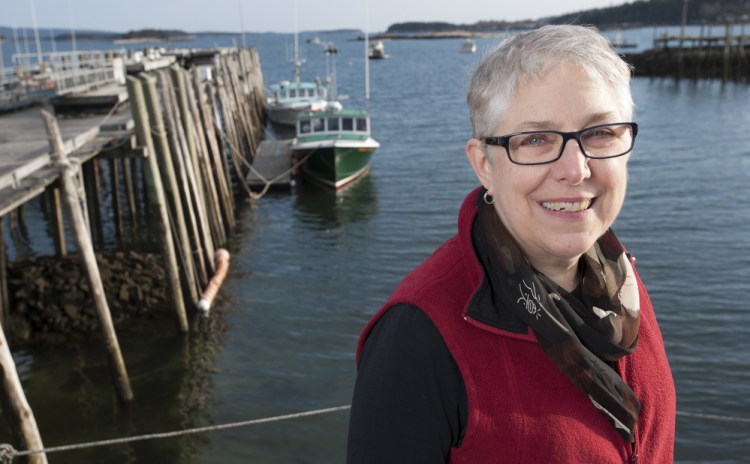Robin Alden was covering a fisheries conference when a shrimper and a shrimp biologist began yelling at each other.
“It was clear they both knew a lot about shrimp,” she recalled, “but they couldn’t hear each other.”
That was when Alden got the idea of bridging their two worlds through a new publication, Commercial Fisheries News. In the years since, Alden has made it her life’s work to help fishermen, scientists and fisheries managers understand each other better, with the goal of making local fisheries more sustainable for Maine’s coastal communities and future generations, and more adaptable to economic forces and climate change.
Alden, the recipient of Source’s Innovator Award, has worked toward this goal through her work as a reporter and editor, and through a stint as commissioner of the Maine Department of Marine Resources, in which she gave frustrated fishermen more voice and responsibility in management decisions. Today, she is co-founder and executive director of the Penobscot East Resource Center in Stonington.
By tapping into fishermen’s micro-local knowledge of fisheries and connecting that knowledge with scientific findings, this “co-management” model has helped ease years of mistrust and bitterness between those two worlds and led to more intelligent policy decisions that are already showing results.
Fisheries co-management is not new, says Robert Pomeroy, a professor at the University of Connecticut who is considered a world expert on the topic. It began in Asia about 30 years ago, he said, but has been slow to be adopted in the United States.
Alden and the Penobscot East Resource Center “have really been a leader in the United States and even into Canada in terms of how to implement cooperation between government, scientists and fishermen,” Pomeroy said.
One of the center’s most visible successes has been helping to turn around Maine’s scallop fishery, which collapsed several years ago. Alden and her staff worked with local fishermen and state fisheries managers to design a new approach. They created scallop fishing zones and a system of rotational closures based on information provided by the scallop fishermen, who also helped monitor the catch.
The result? The scallop fishery is now thriving. While scallop landings were worth just $200,000 in 2004, last year they brought in more than $5 million.
Alden describes her role in the project as “the grease” and gives more credit to the “fishermen who took responsibility and managers who stepped up to work with them.”
But Carole Martin, a Maine-based national consultant who specializes in shared leadership and complex community collaborations praises Alden as a “thought leader” in bringing people together, viewing problems as opportunities, and emphasizing how new ways of thinking can change how problems are defined and solved.
Alden recognizes when she needs to make decisions, Martin said, and when decisions are best left to the group. Beyond that, she has credibility with the government, with nonprofits and in the for-profit realm.
“All of the research shows that one of the number one elements that allows innovators to be successful in the collaborative realm is that they are credible and highly trusted,” Martin said. “And Robin epitomizes that fundamental trust. People are willing to try new things with an innovator. When it involves collaboration, you need to trust the person first. It doesn’t matter how brilliant the innovation is, if the person isn’t trusted, it just won’t work because people are not going to take risks with big changes. So that precursor is really important to her success, and that’s no small feat.”
What’s next? Fishermen have told Alden “you’ve got to get us earlier. You’ve got to get us in high school.”
So the Penobscot East Resource Center created the Eastern Maine Skippers Program, a program launched in seven Maine high schools. Sixty students are participating this year, up from 43 last year.
“We are targeting kids who want to go fishing and also kids who are interested in learning regular academics through the lens of relevant, real marine questions,” Alden said.
The students learn practical skills, like how to tie knots. And they learn academic skills like math, by studying navigation and the ins and outs of running a small fishing business. But the most important part of the curriculum is all about co-management.
“The existential question we’re asking is how do you have human beings live off of a natural system and do it in a way that the human system adjusts to the changes that are happening in the natural system?” Alden said. “How do we fish it so we continue to sustain ourselves and it continues to produce?”
Send questions/comments to the editors.




Success. Please wait for the page to reload. If the page does not reload within 5 seconds, please refresh the page.
Enter your email and password to access comments.
Hi, to comment on stories you must . This profile is in addition to your subscription and website login.
Already have a commenting profile? .
Invalid username/password.
Please check your email to confirm and complete your registration.
Only subscribers are eligible to post comments. Please subscribe or login first for digital access. Here’s why.
Use the form below to reset your password. When you've submitted your account email, we will send an email with a reset code.